牛津译林版(2019)选择性必修 第一册Unit 4 Exploring poetry Welcome to the unit and Reading课件(共110张PPT)
文档属性
| 名称 | 牛津译林版(2019)选择性必修 第一册Unit 4 Exploring poetry Welcome to the unit and Reading课件(共110张PPT) |
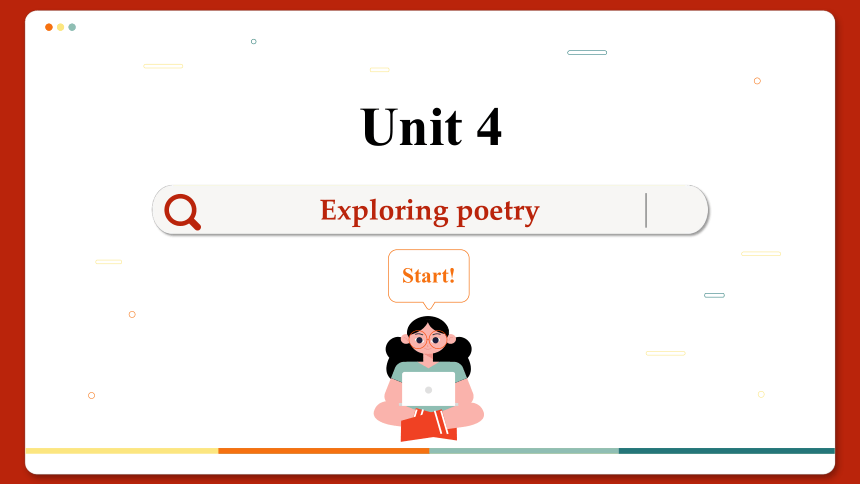
|
|
| 格式 | pptx | ||
| 文件大小 | 8.3MB | ||
| 资源类型 | 教案 | ||
| 版本资源 | 牛津译林版(2019) | ||
| 科目 | 英语 | ||
| 更新时间 | 2024-04-17 21:54:38 | ||
图片预览

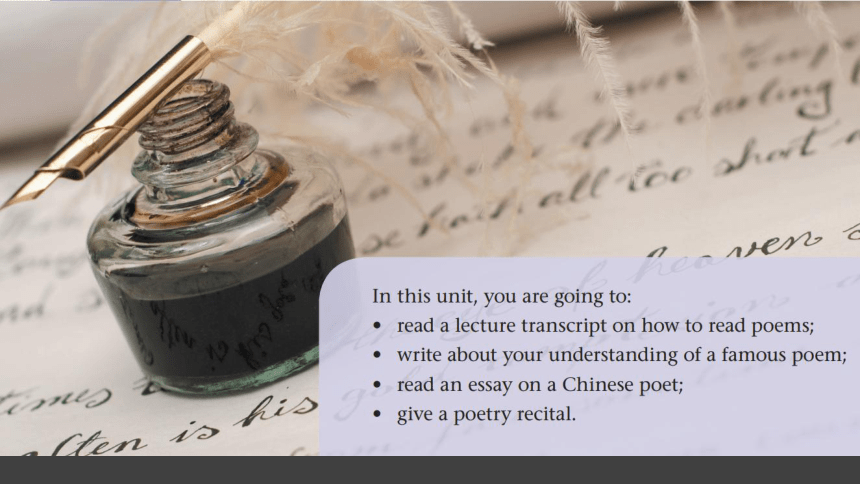

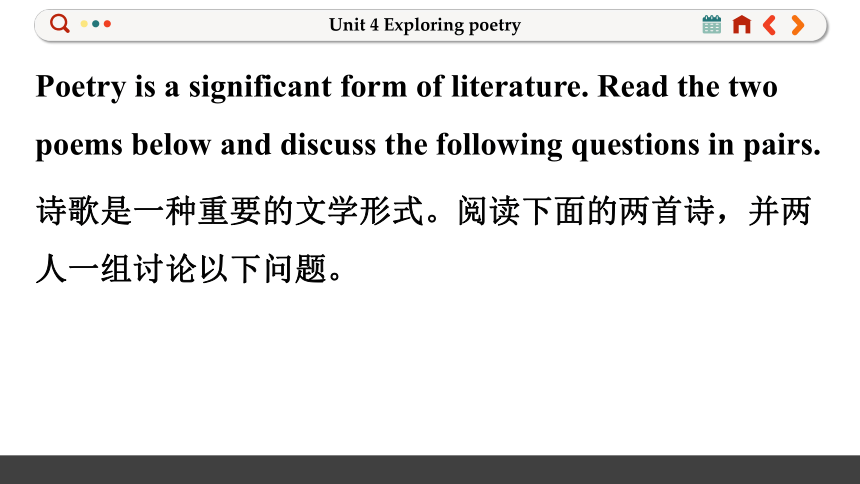
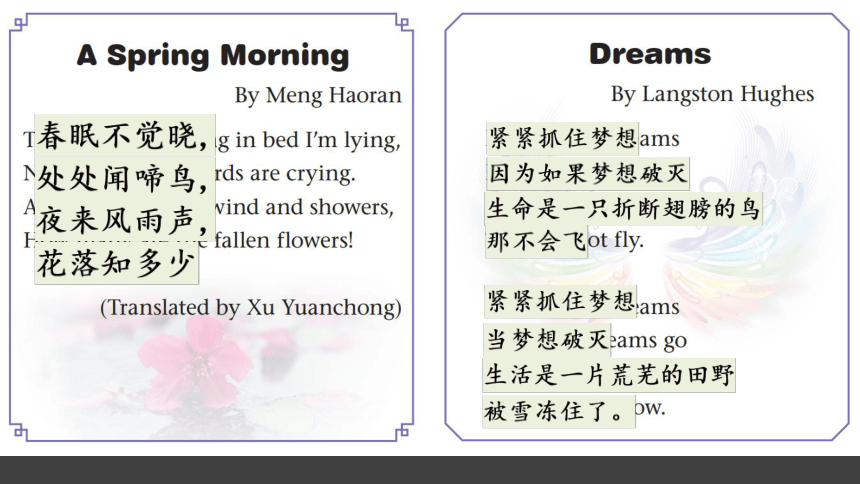
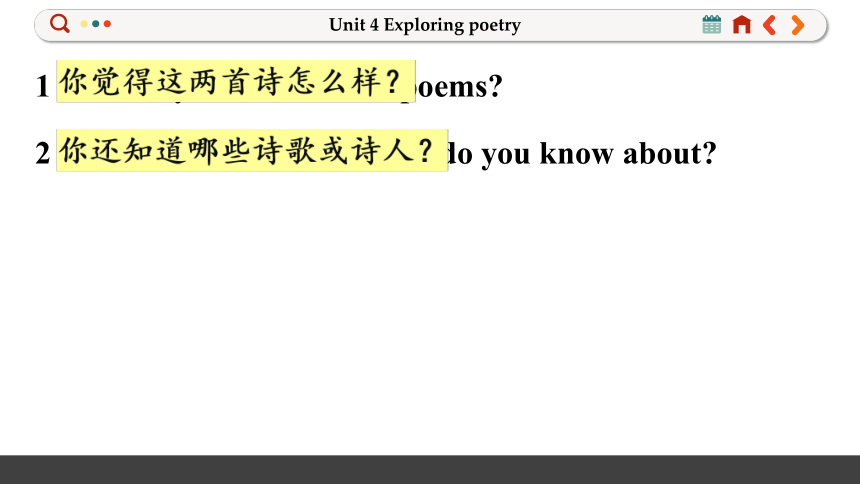

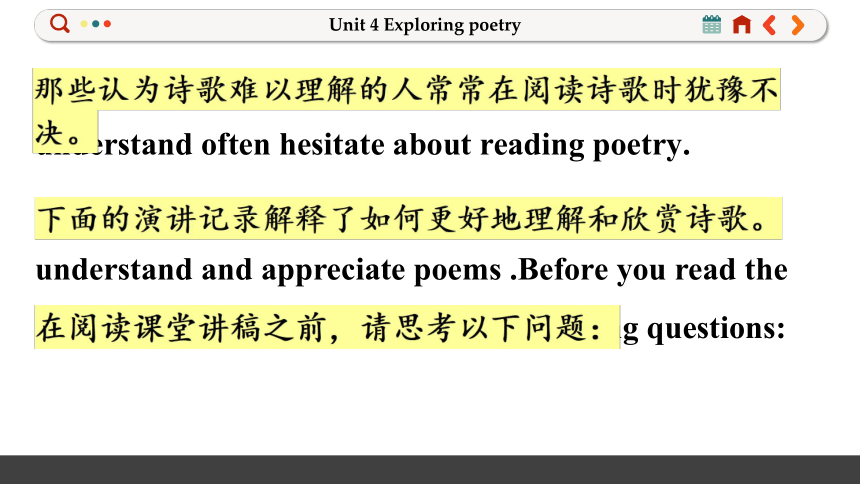
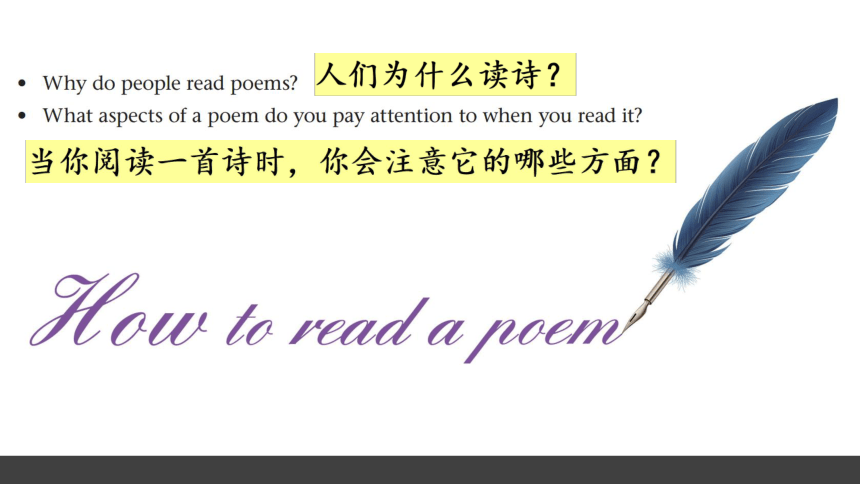
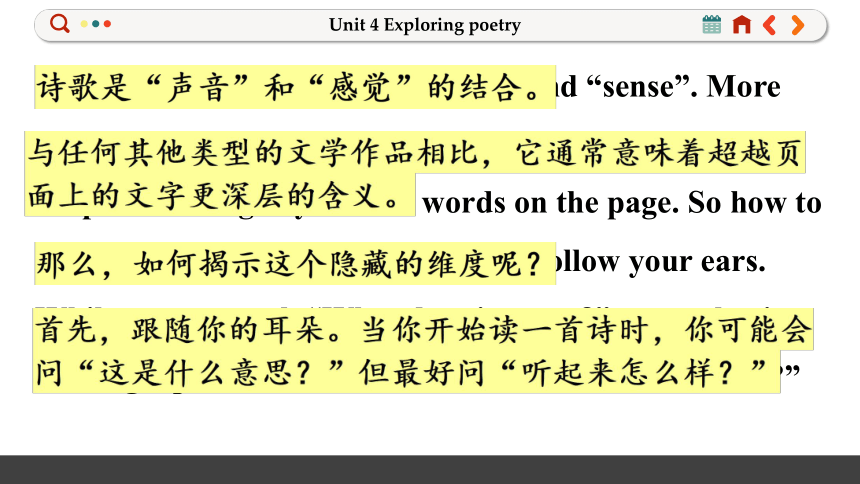

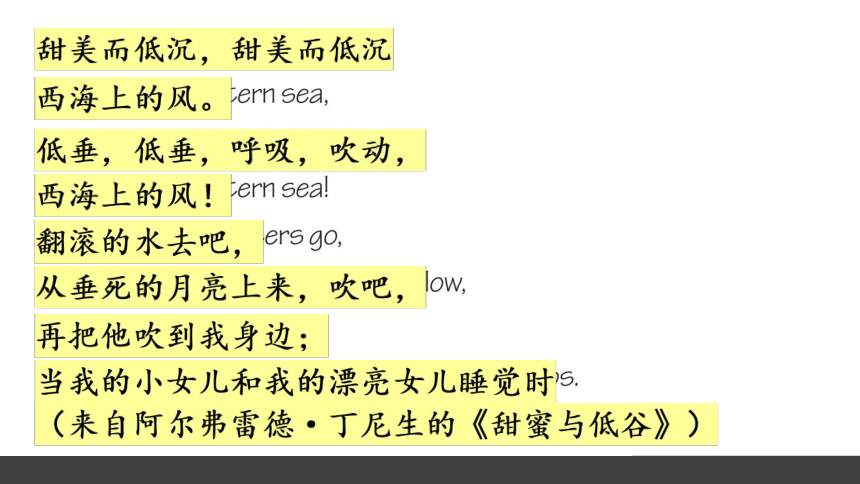
文档简介
(共110张PPT)
Unit 4
Exploring poetry
Welcome to the unit
Poetry is a significant form of literature. Read the two poems below and discuss the following questions in pairs.
诗歌是一种重要的文学形式。阅读下面的两首诗,并两人一组讨论以下问题。
1 How do you like the two poems
2 What other poems or poets do you know about
Reading
People with the impression that poetry is difficult to understand often hesitate about reading poetry.
The lecture transcript below explains how to better understand and appreciate poems .Before you read the lecture transcript, think about the following questions:
Poetry is a combination of “sound” and “sense”. More than any other type of literature, it usually implies a deeper meaning beyond the words on the page. So how to reveal this hidden dimension First, follow your ears. While you may ask “What does it mean ” as you begin reading a poem, it is better to ask “How does it sound ”
Even if its true meaning appears to be beyond your grasp, you can always say something about how the poem sounds when you read it aloud. Do you detect a rhythm Are there any repeated words, rhymes or other special effects All of these are good qualities to notice, and they may lead you to a better understanding of the poem in the end Read these lines to feel how they sound
Second, approach the poem as if you were an explorer in an unfamiliar landscape .Ask some basic questions about the poem. Who is talking ho is being talked to! What is being described Is there a sense of place Are there other people or objects there As you explore the poem, you will begin to see images in your mind.
What are those images, and what happens when they are put together This combination is often complex or even contradictory. As you slowly explore your surroundings, you will start to dig up clues that give you a greater understanding of the poem. Read these lines, pay attention to the image of the caged bird and try to find out what it means.
Third, if you are still struggling to interpret the meaning of a poem even with much pains taking effort, just have some patience. You cannot really understand a poem that you have only read once. Sometimes reading a poem can be a lifelong job. So if you do not get it, set the poem aside and come back to it later.
As an explorer you will not reach your goal immediately you need to go on a journey to a remote and unknown destination.
This may seem difficult at first, but when you finally make your great discovery, your efforts will be rewarded.
Poems that are easy to understand are often less interesting than those that constantly reveal deeper and previously unrecognized meanings.
Read these lines and try to find out what they mean.
Finally, remember that you do not have to fully understand a poem to appreciate it.
You might need to abandon logical thinking to discover its true inner beauty. As long as the journey of poetry reading makes you feel something or lets you perceive another level of meaning, it will have been worth your effort
Poetry's combination of “sound” and “sense” makes you see the world in a new way and allows you to go beyond normal reality for the everlasting beauty.
Enjoy your journey in the world of poetry!
A1 The lecture transcript gives four tips on how to understand a poem from two aspects Read the lecture transcript and complete the chart below.
A2 Read the lecture transcript again carefully and answer the following questions.
1.How is poetry different from other types of literature
2. What aspects should you pay special attention to when you read a poem aloud
3. What are the basic questions you should ask to understand a poem
4. What does the lecturer think of poems that are easy to understand
A3 In pairs, discuss the following questions.
1.Choose one of the poems in the lecture transcript and think about the sound and sense of the poem How does it make you feel
2. The lecturer says that one does not need to fully understand a poem to appreciate it.
Do you agree Support your opinion with your own experience of reading poetry
B1 The passage below is about a student's experience of reading poetry.
Complete the passage with the correct forms of the words and phrases in the box below.
I love reading poetry and I try to (1)____________some time each day to read poems.
Poetry can take me to (2) __________mountaintops covered with mist,it can also take me inside someone else's mind.
Poetry can describe things that are too (3) __________to express in any other way; it can also display the hidden beauty of simple and ordinary things.
I like poems that are (4) ____________________: it is exciting when the poet starts with one particular image, and then adds something that seems to be out of place--it is the lines which stick out that make a poem interesting
(5) ________________ poetry can be difficult, but what I love about poetry is that it makes me wonder--sometimes it is like a riddle that I want to solve, or a question that I want to answer. When I start reading a new poem, I may say to myself, “This is confusing I don't like it."
However, many of my favourite poems are the ones I did not like at first. With poetry, I know I have to be patient: I will not be(6) _______________immediately, but when I finally understand a poem, it will stay with me for a long time. Also, when I read poetry regularly, I (7) ____________discover new things-even in poems that I have read many times before.
Reading poetry is like trying to find and (8) __________a treasure: I can use a poem as a treasure map that will eventually guide me to exciting new discoveries.
B2 The lecture transcript uses some compound adjectives. Note the following words and think of more compound adjectives formed in similar ways. Then fill in the table with as many compound adjectives as you can.
B3 Find the lines in the lecture transcript that rhyme and write lines of your own using words in rhyme.
In poetry, it is common to have lines that rhyme; that is to say, these lines have a repetition of the same sound at the end. This makes poetry sound beautiful.
Grammar and usage
Below is an introduction to Romantic poetry.
Find the sentences that use to-infinitives, verb-ing or verb-ed forms and fill in the table below. One has been done for you.
Romanticism was a cultural movement from the late 18th to the mid-19th century.
It was a time when many painters, musicians, novelists and poets looked at the world in new and different ways. The aim of the Romantics was to break with the ideals of the 18th century:
they refused to follow rigid rules; instead, they put emphasis on the importance of imagination and feeling, the love of nature and a return to the past.
In England, the greatest achievements of the Romantic movement lay in poetry, especially that of William Wordsworth, Samuel Taylor Coleridge, George Gordon Byron and Percy Bysshe Shelley.
During that time, England was undergoing a process called industrialization. Large factories were being built and people were made to work long hours. Romantic poets were often not pleased with what was happening in their country and they were not always interested in the improvements in science.
Instead, they advocated going back to nature.
As a result, celebrating the beauty of nature and country life became a common theme in Romantic poetry.
The poets also wrote about individual feelings and beliefs.
Exploring the world of emotion and showing the beauty of nature, the poetry of the Romantic era is one of the greatest treasures in Western literature.
Subjects
Predicatives The aim of the Romantics was to break with ...
Objects
Complements
Attributives
Adverbials
celebrating the beauty of nature and country life became a common theme in Romantic poetry
... they refused to follow rigid rules; ...Instead, they advocated going back to nature.
... people were made to work long hours
... process called industrialization.
Exploring the world of emotion and showing thebeauty of nature, ...
active
passive
a, b, c, d, e, f
a, b, c, d, e, f
b, d, e, f
B1 Rewrite the following sentences using to-infinitives, verb-ing or verb-ed forms.
B2 Below is an article about the English poet William Wordsworth.
Complete the article with the correct to-infinitives, verb-ing or verb-ed forms of the verbs in the brackets.
Born in 1770, William Wordsworth was one of the (1) ________(lead)poets of the Romantic movement in England. (2)_____________(grow) up in the beautiful Lake District, Wordsworth had a childhood that was perfect for a developing poet.(3) _________(educate) at Cambridge, Wordsworth received his degree in 1791.
leading
growing
educated
He spent a lot of time (4) _______(tour) in Europe. Travelling obviously provided Wordsworth with plenty of ideas for his poems. In1795, he met Samuel Taylor Coleridge and the two talented young men became close friends.(5) ___________(meet) Coleridge had a huge impact on Wordsworth.
touring
meeting
Lyrical Ballads, a collection of poems (6) _______(write) together with Coleridge, was Wordsworth's first great work. It was published in 1798 and marked the start of the Romantic era in poetry. Wordsworth explained that they wanted to write poetry that ordinary people could use (7) _____________(express) their feelings.
writen
to express
Many of the poems in the collection were about returning to nature. Like other Romantics, Wordsworth preferred (8) ____________(live) in the country rather than in the city.
to live
B3 Write about the importance of reading poems. Think of at least one reason and give supporting details, using to-infinitives, verb-ing or verb-ed forms. Use the example below to help you.
Reading poems helps me understand the beauty of language. There are a lot of poetic devices employed in poems, such as rhyme and metaphor. When reading these beautifully written lines, I can enjoy the beauty of the language.
Integrated skills
A Read Robert Frost’s poem “The Road Not Taken”
B A teacher is giving a lecture introducing Robert Frost and his poem "The Road Not Taken".
Watch the video and finish the exercises below.
B1 Watch the video and answer the following questions
1 What is Robert Frost's writing style like
2 When was “The Road Not Taken” first published
3 What does the image of the two roads stand for
4 What was the difficult path the poet took
Tip
Understanding a lecture
While listening to a lecture, you can read the PPT slides, which usually give the out line of the lecture.
lf the lecturer stresses a certain word or phrase,or repeats it, it is probably a key point and you must pay special attention to it.
Robert Frost and his poem “The Road Not Taken”
About the poem
The story behind the poem
> The poem was inspired by Frost's (4)______________________in the countryside with Edward Thomas.
Thomas often spent a long time choosing which path to take and afterwards, he would complain that he had picked(5)_____________________
How to understand the poem
>When faced with two paths, people have no choice but to make a decision and see what will happen.
>Many people assume that the poet encourages the reader to take (6)_________________through life. You can have your own understanding of the poem.
C ln pairs, discuss the poem “The Road Not Taken”. Use the following questions and expressions to help you.
What message do you think the poem is trying to get across to readers
Have you ever been in a similar situation
Connect your personal experience with the poem.
D Write an article about your understanding of "The Road Not Taken". Use your ideas from part C and the information in parts A and B to help you.
Learning about the text type
An article about your understanding of a poem is called a poetry review, in which you describe the symbolic meaning of the words and images in a poem and provide a personal understanding of the poem.
Learning about the structure
When writing an article about your understanding of the poem, you can follow the structure below:
Introduce the poet and the poem briefly.
Analyse and evaluate the artistic characteristics of the poem, such as its sound images and figurative devices.
Give your understanding of the poem's meaning.
It is a good idea to refer to your personal experience or emotion in this part.
Learning about the language
To express your opinion, you can use expressions such as
Extended reading
It is believed that this poem was written by Li Bai in his teenage years.
With striking imagination in expressions like “scaring dwellers on high", this early poem already displayed signs of a romantic style, which was later to characterize Li Bai's poetry.
Li Bai's love of reading and travelling from an early age contributed to his romantic style.
He started studying the classics when he was only five years old, and was reading ancient philosophers of different schools at the age of ten, including Confucianism and Taoism.
By reading books of all kinds, from legends to historical stories, he familiarized himself with classical Chinese culture, and more importantly, he acquired the wisdom of previous generations.
Driven by a burning desire for adventure and travel, Li Bai left home and started to travel around in his early twenties.
His footsteps covered almost the whole country
During his travels, he visited famous mountains and great rivers, encountering different customs and practices.
These travelling experiences also nourished his love of nature and inspired him to write numerous poems in the romantic style.
Li Bai's romantic style was also deeply rooted in the social and historical context in which he lived.
Li Bai grew up in the most glorious period of the Tang Dynasty,
a time of economic boom and social stability.
This open and tolerant atmosphere allowed Li Bai the liberty to develop a free and unconstrained personality, which, in turn, had a huge impact on his poetic production.
Given his personal experiences and the historical background, it is only natural to see that the majority of Li Bai's poems are characterized by the romantic style. Even the most uninformed reader would not fail to be impressed by the poet's rich imagination. The moon and stars in the sky, the natural landscape and the figures in legends all become a vehicle for his imagination.
Equally impressive is Li Bai's free expression of strong feelings, which breathes vitality into the lifeless objects he describes, and which distinguishes him from other landscape poets. These features are inseparable from Li Bai's wide use of exaggeration, metaphor and other artistic techniques. The poem below, written in his fifties, is representative of his romantic style:
With his extraordinary imagination, free expression of strong feelings and mastery of language, Li Bai is widely recognized as the greatest romantic poet after Qu Yuan. Generations of poets, both in China and abroad, owe a debt to his inspirational poems.
One such poet is Ezra Pound, a 20th-century American poet.
He was fascinated by Li Bai's poems and translated some of them in his 1915 poetry collection entitled Cathay. Today Li Bai's poetry continues to be enjoyed by countless readers around the world.
Project
C As a group, recite the poem in front of the rest of the class. Make sure to speak loudly, clearly and slowly. Use the example below to help you.
Assessment
Answer the following questions to assess your performance.
Then work in groups and exchange your answers with your partners.
①How can the tips given in the lecture transcript help you appreciate a poem!
②Are you interested in the writing topic of this unit Why or why not
③How well do you know about Li Bai's life and his romantic poetry
④How do you like your experience of giving a poetry recital Do you want to try again Why or why not
⑤ What new words have you learnt from this unit List some of them.
*⑥ What grammar have you learnt from this unit Make a sentence with the grammar.
*⑦ What tips have you learnt from this unit Make a list of them.
⑧ How are you going to improve your overall performance Make an action plan.
Further study
Poetry is an art form that has existed for thousands of years. It uses language in an imaginative and unique way. Reading poemcollections is a good way to discover different poetry styles used by poets through the ages and from around the world. Find a poem collection and read it to learn more about this timeless art form.
The documentary looks at the1life story of Du Fu through the places he visited and lived in.
Experts provide interpretations of Du Fu's works from different perspectives. Watch it and discover the importance of Du's poetry in China and its influence on the world.
Unit 4
Exploring poetry
Welcome to the unit
Poetry is a significant form of literature. Read the two poems below and discuss the following questions in pairs.
诗歌是一种重要的文学形式。阅读下面的两首诗,并两人一组讨论以下问题。
1 How do you like the two poems
2 What other poems or poets do you know about
Reading
People with the impression that poetry is difficult to understand often hesitate about reading poetry.
The lecture transcript below explains how to better understand and appreciate poems .Before you read the lecture transcript, think about the following questions:
Poetry is a combination of “sound” and “sense”. More than any other type of literature, it usually implies a deeper meaning beyond the words on the page. So how to reveal this hidden dimension First, follow your ears. While you may ask “What does it mean ” as you begin reading a poem, it is better to ask “How does it sound ”
Even if its true meaning appears to be beyond your grasp, you can always say something about how the poem sounds when you read it aloud. Do you detect a rhythm Are there any repeated words, rhymes or other special effects All of these are good qualities to notice, and they may lead you to a better understanding of the poem in the end Read these lines to feel how they sound
Second, approach the poem as if you were an explorer in an unfamiliar landscape .Ask some basic questions about the poem. Who is talking ho is being talked to! What is being described Is there a sense of place Are there other people or objects there As you explore the poem, you will begin to see images in your mind.
What are those images, and what happens when they are put together This combination is often complex or even contradictory. As you slowly explore your surroundings, you will start to dig up clues that give you a greater understanding of the poem. Read these lines, pay attention to the image of the caged bird and try to find out what it means.
Third, if you are still struggling to interpret the meaning of a poem even with much pains taking effort, just have some patience. You cannot really understand a poem that you have only read once. Sometimes reading a poem can be a lifelong job. So if you do not get it, set the poem aside and come back to it later.
As an explorer you will not reach your goal immediately you need to go on a journey to a remote and unknown destination.
This may seem difficult at first, but when you finally make your great discovery, your efforts will be rewarded.
Poems that are easy to understand are often less interesting than those that constantly reveal deeper and previously unrecognized meanings.
Read these lines and try to find out what they mean.
Finally, remember that you do not have to fully understand a poem to appreciate it.
You might need to abandon logical thinking to discover its true inner beauty. As long as the journey of poetry reading makes you feel something or lets you perceive another level of meaning, it will have been worth your effort
Poetry's combination of “sound” and “sense” makes you see the world in a new way and allows you to go beyond normal reality for the everlasting beauty.
Enjoy your journey in the world of poetry!
A1 The lecture transcript gives four tips on how to understand a poem from two aspects Read the lecture transcript and complete the chart below.
A2 Read the lecture transcript again carefully and answer the following questions.
1.How is poetry different from other types of literature
2. What aspects should you pay special attention to when you read a poem aloud
3. What are the basic questions you should ask to understand a poem
4. What does the lecturer think of poems that are easy to understand
A3 In pairs, discuss the following questions.
1.Choose one of the poems in the lecture transcript and think about the sound and sense of the poem How does it make you feel
2. The lecturer says that one does not need to fully understand a poem to appreciate it.
Do you agree Support your opinion with your own experience of reading poetry
B1 The passage below is about a student's experience of reading poetry.
Complete the passage with the correct forms of the words and phrases in the box below.
I love reading poetry and I try to (1)____________some time each day to read poems.
Poetry can take me to (2) __________mountaintops covered with mist,it can also take me inside someone else's mind.
Poetry can describe things that are too (3) __________to express in any other way; it can also display the hidden beauty of simple and ordinary things.
I like poems that are (4) ____________________: it is exciting when the poet starts with one particular image, and then adds something that seems to be out of place--it is the lines which stick out that make a poem interesting
(5) ________________ poetry can be difficult, but what I love about poetry is that it makes me wonder--sometimes it is like a riddle that I want to solve, or a question that I want to answer. When I start reading a new poem, I may say to myself, “This is confusing I don't like it."
However, many of my favourite poems are the ones I did not like at first. With poetry, I know I have to be patient: I will not be(6) _______________immediately, but when I finally understand a poem, it will stay with me for a long time. Also, when I read poetry regularly, I (7) ____________discover new things-even in poems that I have read many times before.
Reading poetry is like trying to find and (8) __________a treasure: I can use a poem as a treasure map that will eventually guide me to exciting new discoveries.
B2 The lecture transcript uses some compound adjectives. Note the following words and think of more compound adjectives formed in similar ways. Then fill in the table with as many compound adjectives as you can.
B3 Find the lines in the lecture transcript that rhyme and write lines of your own using words in rhyme.
In poetry, it is common to have lines that rhyme; that is to say, these lines have a repetition of the same sound at the end. This makes poetry sound beautiful.
Grammar and usage
Below is an introduction to Romantic poetry.
Find the sentences that use to-infinitives, verb-ing or verb-ed forms and fill in the table below. One has been done for you.
Romanticism was a cultural movement from the late 18th to the mid-19th century.
It was a time when many painters, musicians, novelists and poets looked at the world in new and different ways. The aim of the Romantics was to break with the ideals of the 18th century:
they refused to follow rigid rules; instead, they put emphasis on the importance of imagination and feeling, the love of nature and a return to the past.
In England, the greatest achievements of the Romantic movement lay in poetry, especially that of William Wordsworth, Samuel Taylor Coleridge, George Gordon Byron and Percy Bysshe Shelley.
During that time, England was undergoing a process called industrialization. Large factories were being built and people were made to work long hours. Romantic poets were often not pleased with what was happening in their country and they were not always interested in the improvements in science.
Instead, they advocated going back to nature.
As a result, celebrating the beauty of nature and country life became a common theme in Romantic poetry.
The poets also wrote about individual feelings and beliefs.
Exploring the world of emotion and showing the beauty of nature, the poetry of the Romantic era is one of the greatest treasures in Western literature.
Subjects
Predicatives The aim of the Romantics was to break with ...
Objects
Complements
Attributives
Adverbials
celebrating the beauty of nature and country life became a common theme in Romantic poetry
... they refused to follow rigid rules; ...Instead, they advocated going back to nature.
... people were made to work long hours
... process called industrialization.
Exploring the world of emotion and showing thebeauty of nature, ...
active
passive
a, b, c, d, e, f
a, b, c, d, e, f
b, d, e, f
B1 Rewrite the following sentences using to-infinitives, verb-ing or verb-ed forms.
B2 Below is an article about the English poet William Wordsworth.
Complete the article with the correct to-infinitives, verb-ing or verb-ed forms of the verbs in the brackets.
Born in 1770, William Wordsworth was one of the (1) ________(lead)poets of the Romantic movement in England. (2)_____________(grow) up in the beautiful Lake District, Wordsworth had a childhood that was perfect for a developing poet.(3) _________(educate) at Cambridge, Wordsworth received his degree in 1791.
leading
growing
educated
He spent a lot of time (4) _______(tour) in Europe. Travelling obviously provided Wordsworth with plenty of ideas for his poems. In1795, he met Samuel Taylor Coleridge and the two talented young men became close friends.(5) ___________(meet) Coleridge had a huge impact on Wordsworth.
touring
meeting
Lyrical Ballads, a collection of poems (6) _______(write) together with Coleridge, was Wordsworth's first great work. It was published in 1798 and marked the start of the Romantic era in poetry. Wordsworth explained that they wanted to write poetry that ordinary people could use (7) _____________(express) their feelings.
writen
to express
Many of the poems in the collection were about returning to nature. Like other Romantics, Wordsworth preferred (8) ____________(live) in the country rather than in the city.
to live
B3 Write about the importance of reading poems. Think of at least one reason and give supporting details, using to-infinitives, verb-ing or verb-ed forms. Use the example below to help you.
Reading poems helps me understand the beauty of language. There are a lot of poetic devices employed in poems, such as rhyme and metaphor. When reading these beautifully written lines, I can enjoy the beauty of the language.
Integrated skills
A Read Robert Frost’s poem “The Road Not Taken”
B A teacher is giving a lecture introducing Robert Frost and his poem "The Road Not Taken".
Watch the video and finish the exercises below.
B1 Watch the video and answer the following questions
1 What is Robert Frost's writing style like
2 When was “The Road Not Taken” first published
3 What does the image of the two roads stand for
4 What was the difficult path the poet took
Tip
Understanding a lecture
While listening to a lecture, you can read the PPT slides, which usually give the out line of the lecture.
lf the lecturer stresses a certain word or phrase,or repeats it, it is probably a key point and you must pay special attention to it.
Robert Frost and his poem “The Road Not Taken”
About the poem
The story behind the poem
> The poem was inspired by Frost's (4)______________________in the countryside with Edward Thomas.
Thomas often spent a long time choosing which path to take and afterwards, he would complain that he had picked(5)_____________________
How to understand the poem
>When faced with two paths, people have no choice but to make a decision and see what will happen.
>Many people assume that the poet encourages the reader to take (6)_________________through life. You can have your own understanding of the poem.
C ln pairs, discuss the poem “The Road Not Taken”. Use the following questions and expressions to help you.
What message do you think the poem is trying to get across to readers
Have you ever been in a similar situation
Connect your personal experience with the poem.
D Write an article about your understanding of "The Road Not Taken". Use your ideas from part C and the information in parts A and B to help you.
Learning about the text type
An article about your understanding of a poem is called a poetry review, in which you describe the symbolic meaning of the words and images in a poem and provide a personal understanding of the poem.
Learning about the structure
When writing an article about your understanding of the poem, you can follow the structure below:
Introduce the poet and the poem briefly.
Analyse and evaluate the artistic characteristics of the poem, such as its sound images and figurative devices.
Give your understanding of the poem's meaning.
It is a good idea to refer to your personal experience or emotion in this part.
Learning about the language
To express your opinion, you can use expressions such as
Extended reading
It is believed that this poem was written by Li Bai in his teenage years.
With striking imagination in expressions like “scaring dwellers on high", this early poem already displayed signs of a romantic style, which was later to characterize Li Bai's poetry.
Li Bai's love of reading and travelling from an early age contributed to his romantic style.
He started studying the classics when he was only five years old, and was reading ancient philosophers of different schools at the age of ten, including Confucianism and Taoism.
By reading books of all kinds, from legends to historical stories, he familiarized himself with classical Chinese culture, and more importantly, he acquired the wisdom of previous generations.
Driven by a burning desire for adventure and travel, Li Bai left home and started to travel around in his early twenties.
His footsteps covered almost the whole country
During his travels, he visited famous mountains and great rivers, encountering different customs and practices.
These travelling experiences also nourished his love of nature and inspired him to write numerous poems in the romantic style.
Li Bai's romantic style was also deeply rooted in the social and historical context in which he lived.
Li Bai grew up in the most glorious period of the Tang Dynasty,
a time of economic boom and social stability.
This open and tolerant atmosphere allowed Li Bai the liberty to develop a free and unconstrained personality, which, in turn, had a huge impact on his poetic production.
Given his personal experiences and the historical background, it is only natural to see that the majority of Li Bai's poems are characterized by the romantic style. Even the most uninformed reader would not fail to be impressed by the poet's rich imagination. The moon and stars in the sky, the natural landscape and the figures in legends all become a vehicle for his imagination.
Equally impressive is Li Bai's free expression of strong feelings, which breathes vitality into the lifeless objects he describes, and which distinguishes him from other landscape poets. These features are inseparable from Li Bai's wide use of exaggeration, metaphor and other artistic techniques. The poem below, written in his fifties, is representative of his romantic style:
With his extraordinary imagination, free expression of strong feelings and mastery of language, Li Bai is widely recognized as the greatest romantic poet after Qu Yuan. Generations of poets, both in China and abroad, owe a debt to his inspirational poems.
One such poet is Ezra Pound, a 20th-century American poet.
He was fascinated by Li Bai's poems and translated some of them in his 1915 poetry collection entitled Cathay. Today Li Bai's poetry continues to be enjoyed by countless readers around the world.
Project
C As a group, recite the poem in front of the rest of the class. Make sure to speak loudly, clearly and slowly. Use the example below to help you.
Assessment
Answer the following questions to assess your performance.
Then work in groups and exchange your answers with your partners.
①How can the tips given in the lecture transcript help you appreciate a poem!
②Are you interested in the writing topic of this unit Why or why not
③How well do you know about Li Bai's life and his romantic poetry
④How do you like your experience of giving a poetry recital Do you want to try again Why or why not
⑤ What new words have you learnt from this unit List some of them.
*⑥ What grammar have you learnt from this unit Make a sentence with the grammar.
*⑦ What tips have you learnt from this unit Make a list of them.
⑧ How are you going to improve your overall performance Make an action plan.
Further study
Poetry is an art form that has existed for thousands of years. It uses language in an imaginative and unique way. Reading poemcollections is a good way to discover different poetry styles used by poets through the ages and from around the world. Find a poem collection and read it to learn more about this timeless art form.
The documentary
Experts provide interpretations of Du Fu's works from different perspectives. Watch it and discover the importance of Du's poetry in China and its influence on the world.
同课章节目录
- Unit 1 Food matters
- Welcome to the unit
- Reading
- Grammar and usage
- Integrated skills
- Extended reading
- Project
- Unit 2 The Universal Language
- Welcome to the unit
- Reading
- Grammar and usage
- Integrated skills
- Extended reading
- Project
- Unit 3 The art of painting
- Welcome to the unit
- Reading
- Grammar and usage
- Integrated skills
- Extended reading
- Project
- Unit 4 Exploring poetry
- Welcome to the unit
- Reading
- Grammar and usage
- Integrated skills
- Extended reading
- Project
